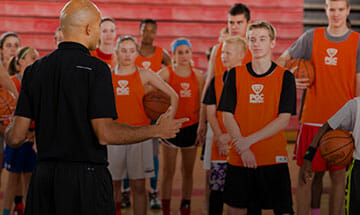What Does Leadership Look Like?
What Does Leadership Look Like?
Matt Dyment was a basketball player at Linfield College in McMinnville, Oregon. He is also one of the finest leaders I have ever seen on and off a basketball court. I offer some examples of Matt’s leadership as a yardstick so you can measure your own efforts by comparison.
The off-season letter. This is an ideal way to begin a season, to lay out a goal and a commitment to your coach and your teammates. Here is the letter that Dyment sent to his coach, with the request that his coach send a copy to each of the members of the team.
To the Future Linfield National Champions Hoops Team,
“He is no fool who gives what he cannot keep to gain what he cannot lose.” I hope that your two months of vacation time have been the best ever. As for me, I have been working my tail off looking forward to our upcoming season. Six days ago, Aaron Lee and I began lifting and shooting for (around) two hours a day. (My position of head toilet cleaner on campus has given me the wonderful privilege of gym key use.)
Summer for all of you should now be over. It’s time to begin paying the price for a National Championship, for which the cost is not a small one. We need to be putting more time in than any other team in the nation. We have the talent, we have the character; all we have to do is now pay the price in the weight room, on the court, and in our minds.
“Anything the mind can conceive and believe, it can achieve.”
Do you believe that we can win the NC baby? What are you doing to match your beliefs? If you truly believe that we can win the National Championship, your life will be changed. Work out at top speed, push yourself beyond anything you have ever known, and dream of the days to come.
The only thing that we lack to this point right now is playing together and knowing each other, which is a big ingredient to being a championship caliber team. In order to offset this problem, we are going to have to be very exclusive with our play.
To win big, we must sacrifice big. I have gone ahead and made some preliminary plans for the fall, and I would like to bounce them off you guys as soon as the school year starts.
The Varsity team will be meeting at Coach Doty’s house the first three days of school—Wednesday, Thursday, Friday—for BBQ’s up there to go over our fall game plan and pre-training discussions. Begin putting time in now with extra running, shooting, and lifting so that we can get a phat jump on becoming the first National Championship team Linfield hoops has ever had.
God bless all you guys. I look forward to seeing you soon.
The following 18 incidents I witnessed in a week of being around the Linfield team. Research was unnecessary, though I’m sure more examples of Matt Dyment’s leadership would be obvious if I had decided to undertake it.
1. Team dinners:
The team got together once per week for dinner at someone’s house or apartment. Nothing fancy, just a chance to increase interaction off the court and for all the guys to get to know each other better in a relaxed environment. I’m not sure that Matt initiated the idea for these dinners, but I’d bet on it!
2. Lunchtime workouts—with camcorder:
Usually, Matt works one-on-one, aiming at increasing explosiveness off the dribble. Set up on a tripod, the camcorder gives Matt the opportunity to see, later in the day, just how much effort he puts out, how violently he fakes or explodes, how abruptly he stops, how well he follows through on his shots, and how disruptive his defense is.
3. Shooting schedule—with chart:
Not just shooting around. “Game speed” he calls it, with a teammate. Each group of shots is counted and charted so he knows if he’s improving each day or getting worse.
4. Team meetings:
Called as needed. Sometimes to urge greater effort, sometimes to remind everyone of their commitment and what it will take to get there.
5. Team videos:
Matt asks his coach if he can take home the filmed scrimmages, despite the fact that the team already sees clips of the plays the coach considers particularly important. I think he shows these videos to team members in addition to watching them alone. There is no question that Matt does more than “a little bit extra.”
6. Practice warm-ups:
Matt leads pre-practice and pre-game stretches each day and helps the team, with reminders, to get in a frame of mind to play to the best of their ability.
7. Practice startup:
Before the coach arrives on the court to begin practice, Matt is always there early with the rest of his teammates, getting warmed up, running plays, and working on things that the team needs. He is truly a coach on the court. You get the feeling that, if the coach didn’t show up, practice would go on as usual, productive without him.
8.Practicing with Aaron Lee:
Matt does many of his extra workouts with a friend on the team. Their workouts and extra efforts have a contagious impact on other team members, even those who are not as ambitious, energetic, or committed. Plus, no one can be unaware of the 2-on-1 effect of being in opposition to these guys.
9. Informal meetings with the coach:
Matt walks into his coach’s office once or twice a day for a few minutes just to see what’s going on, maybe to share one idea, or maybe to ask one question or make one suggestion. The coach can’t possibly be unaffected by the obvious nature of Matt’s full commitment.
10. Scouting with the coach—with camcorder:
It was November 12, I think (still twelve days before the start of their season) when Matt decided, along with two teammates, to ride with his coach and watch the game of a future opponent. Matt brought a camcorder so he could tape the team’s plays. (Turns out that’s against NCAA Division III rules, so once informed during the game, Matt walked downstairs and handed the tape over to a school official.)
11. Response to innovation:
During a team meeting with the coach, after a new substitution pattern had been explained, Matt made this comment: “I can think of 106 reasons why I don’t like it, but I also understand coach’s points and I think it does have a chance to help our team. So, I’m buying into it.”
12. Communication on the court:
In every practice, you hear Matt reminding his teammates to play hard and to do the things necessary to win a national championship. Often that reminder comes in the form of two letters: “NC, NC.” Matt keeps the national championship in his mind constantly, and he makes an active effort to keep it in his teammates’ minds during practice.
13. Hustle on the court:
Strawberries on both thighs, knee pads on both legs. No one on Matt’s team has a chance to doubt his commitment. Matt is not reluctant to get on the floor (to put it mildly).
14. In the weight room:
First, Matt makes sure everyone remembers when it’s a lifting day, then encourages and reminds during the lifting.
15. Understanding human behavior:
Matt’s coach says that Matt probably understands his teammates and his coach—and human behavior in general—better than any player he has ever coached.
16. Matt is tuned into his teammates:
He told his coach about one player’s girlfriend problems (the kid got dumped!) and discussed some other players who didn’t share his level of commitment.
17. Team conditioning:
When lack of gym space, an extra-long film session one day, and other atypical events limited the team’s on-the-court time for a few days, Matt put the team through an extra conditioning effort, reminding them when they thought they were finished, “One more. One more. NC, baby, NC.”
18. A coach’s dream:
His coach feels more relaxed coaching this team than any other. Surprise? Hardly. With the team in the hands of Matt Dyment, any coach ought to be able to relax. Where does he find the time? Doesn’t Matt Dyment have a life, go to class, have a girlfriend, read the paper, go to movies? From all indications, Matt has it all. A religious commitment too, plus a girlfriend named Carla and a graduation with honors ahead—in four years.
How does he do all that? Budgeting time, maximizing time? Of course. That goes without saying. From what I could observe and surmise, Matt puts a tremendous amount of time, thought, and energy into everything he does. He is serious about life and enjoys life too.
No doubt there is a lot more to know and say about Matt Dyment, but I think this is enough to give a clear idea of the way to approach sports and life in general. If this kind of commitment seems too much for “just a game,” I think you need to find some other activities that inspire you to approach them with Matt’s level of commitment. Clearly, this kind of commitment is the key to gaining the respect of peers and of people in general; it’s the key to feeling personal happiness and fulfillment; and it’s the key to success in whatever you do.
I have no idea if Linfield College will win a national championship. Sports, like life, takes unexpected twists and turns. But a leader like Matt Dyment sure gives a team a better chance.
Matt’s friend, Aaron Lee, asked his coach for the class schedule of the team’s 7-footer. Matt and Aaron were worried about the big guy remaining academically eligible, and they didn’t want to wait around hoping he would pass everything.
Their goals were team goals, and they knew a 7-footer sometimes helps a basketball team reach the promised land. They didn’t want to take any chances, and they planned to check on him.
That’s leadership.
—Excerpted from the book, “Running the Show”
Related Articles
5 Ways to Practice Mental Toughness
Here are five ways to practice your mental toughness off the court. If you practice these five things, every day, you’ll develop greater self-discipline. You’ll become unstoppable in anything you do. It is five things you will have to rise above your feelings every day. That is how you build mental toughness. You develop, as a habit, a muscle of rising above your feelings to level of your aspirations and commitments.
The Beauty of the Game | The Leadership Podcast
Mano joins Jan Rutherford & Jim Vaselopulos, on The Leadership Podcast to talk about his sports and business experiences with stories and advice on thinking like a coach, communicating, and making a difference in people’s lives.
The Way I End Each Year
For the past few years, I have taken time over the holidays to do the same two exercises: On New Year’s Eve I take time to reflect back on the year; then on New Year’s Day I take time to create my plan for the coming year. These few hours have become really special to me. In fact, I look forward to them with great anticipation. Looking back on the year gives me the chance to pause to celebrate and appreciate all that transpired. My reflection process is the same each year.
About PGC
PGC Basketball provides intense, no-nonsense basketball training for players and coaches. Our basketball camps are designed to teach players of all positions to play smart basketball, be coaches on the court, and be leaders in practices, games and in everyday life.
We combine our unique PGC culture with a variety of teaching methods and learning environments to maximize the learning potential of those that attend our sessions. In addition to spending 6-7 hours on the court each day, lessons will be reinforced through classroom sessions and video analysis.
Our goal at PGC is to empower you with the tools to fulfill your basketball dreams, while also assisting you in experiencing the joy of the journey.
To learn more about PGC Basketball, including additional basketball training tips and videos, visit our YouTube Channel or find us on Facebook, Instagram, and Twitter.













Share This Post